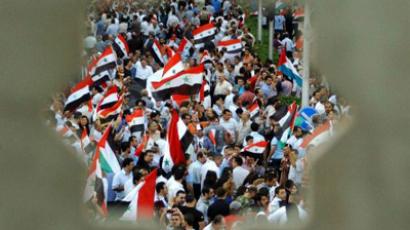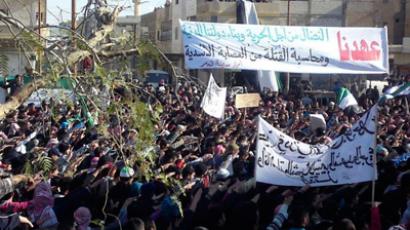Syrian social media crossfire kills users
Syria is vowing to investigate the death of a French TV reporter. He was killed along with eight Syrians when a mortar shell hit a crowd gathered for a pro-government rally. But it is not only the media being caught between the conflicting sides.
Muhammed Mahmud’s son Tamman was an activist who used social networking sites, such as Facebook, to call for peace in Syria. He had phoned his family to tell them to watch him doing an interview on local TV.“I saw him on TV, and he looked well,” his mother told journalists. But it was to be one of the last times the family saw him alive.“Soon after that he was kidnapped. He left home and never returned,” his father explained. “We found his body in the morning, and his face was mutilated. It's too painful for me to remember that moment.”It remains unclear who killed Tamman. His family thinks it may have been militants who thought he was a working for the security forces after seeing him speak on television. But in reality he worked at a sugar mill and was training to become a computer specialist.But, like so many other young educated people in Syria right now, he felt a need to be involved in the changing reality in his country. Syria, in fact, has one of the youngest populations in the Arab world.In schools across Syria younger generations have become better educated than their grandparents’ or parents’ generations. It has meant they are not only more aware of their political rights, but more able to demand them too.Many young opposition supporters have taken their campaign online, relying heavily on social media like Facebook and Twitter – tools which have helped topple regimes in Egypt and Libya.“People’s literacy and also media literacy has been enormously enhanced in recent decades by both education and technological change,” says Mark Almond, a history lecturer at Oxford University. “But I think we should remember this can cut both ways. Opposition sides can try to get out their message and can mobilize people, but also even supporters of governments are much less dependent on a single news station or a single state newspaper.”But between a regime under pressure and an increasingly militarized opposition, many Syrians have been left trapped in the middle.“I have only one question: what did they kill my son for?” Muhammed Mahmud questions. “My son wasn’t a politician or a public figure. Let various movements, national and local, exist in this country. I don’t understand why my son was killed.”Speaking before a crowd, many of whom were young supporters, President Assad once again repeated his promises of reforms and gave a precise timetable, but the move was met with skepticism from the opposition.Meanwhile, on all sides of this conflict young, politically-motivated Syrians remain committed to fighting for the political future of their country, despite the fact that for many like Tamman that fight could end up costing them their lives.














